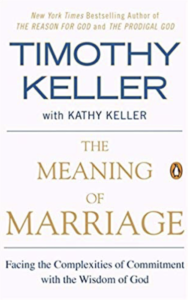We were just kids.
I was just a few weeks shy of turning 20 and Lisa turning 19. In October of 1980, I was a junior in Bible College and a youth pastor. She was a freshman in college.
This past week, we celebrated our 39th wedding anniversary. 40 years ago, we met… and within weeks I knew I wanted to marry this girl.
We dated for six months, got engaged and were married six months later.
One of the many “graces” God gifted us with was advice we received from some wiser, older saints who told us…
“Good marriages don’t just ‘happen.’ They are the product of preparation, work, sacrifice, attentiveness and commitment. Prepare now so you will have deep roots later… and deep roots have the ability to produce beautiful fruit.”
So, at ages 18 & 19 we together read six or seven great books on marriage and discussed them during our engagement. We were reading things we didn’t even fully understand, and had no idea that we would ever need them.
But they were wise words that laid a foundation for what life would bring our way in the years and decades to come.
I always tell couples,
“It’s never too late to start preparing for a better marriage tomorrow.”
 When Lisa and I do pre-marriage counseling with young couples, the book we have used most recently is Tim and Kathy Keller’s excellent work, The Meaning of Marriage: Facing the Complexities of Commitment with the Wisdom of God.
When Lisa and I do pre-marriage counseling with young couples, the book we have used most recently is Tim and Kathy Keller’s excellent work, The Meaning of Marriage: Facing the Complexities of Commitment with the Wisdom of God.
Here are a few meaningful quotes from their book. I pray you are encouraged and blessed by them…
“Within this Christian vision of marriage, here’s what it means to fall in love. It is to look at another person and get a glimpse of what God is creating, and to say, ‘I see who God is making you, and it excites me! I want to be part of that. I want to partner with you and God in the journey you are taking to his throne. And when we get there, I will look at your magnificence and say, ‘I always knew you could be like this. I got glimpses of it on earth, but now look at you!”
“When over the years someone has seen you at your worst, and knows you with all your strengths and flaws, yet commits him – or herself to you wholly, it is a consummate experience. To be loved but not known is comforting but superficial. To be known and not loved is our greatest fear. But to be fully known and truly loved is, well, a lot like being loved by God. It is what we need more than anything. It liberates us from pretense, humbles us out of our self-righteousness, and fortifies us for any difficulty life can throw at us.”
“In any relationship, there will be frightening spells in which your feelings of love dry up. And when that happens you must remember that the essence of marriage is that it is a covenant, a commitment, a promise of future love. So, what do you do? You do the acts of love, despite your lack of feeling. You may not feel tender, sympathetic, and eager to please, but in your actions, you must be tender, understanding, forgiving and helpful. And, if you do that, as time goes on you will not only get through the dry spells, but they will become less frequent and deep, and you will become more constant in your feelings. This is what can happen if you decide to love.”
“Our culture says that feelings of love are the basis for actions of love. And of course, that can be true. But it is truer to say that actions of love can lead consistently to feelings of love.”
“You can only afford to be generous if you actually have some money in the bank to give. In the same way, if your only source of love and meaning is your spouse, then anytime he or she fails you, it will not just cause grief but a psychological cataclysm. If, however, you know something of the work of the Spirit in your life, you have enough love ‘in the bank’ to be generous to your spouse even when you are not getting much affection or kindness at the moment.”
“Sociologists argue that in contemporary Western society the marketplace has become so dominant that the consumer model increasingly characterizes most relationships that historically were covenantal, including marriage. Today we stay connected to people only as long as they are meeting our particular needs at an acceptable cost to us. When we cease to make a profit – that is, when the relationship appears to require more love and affirmation from us than we are getting back – then we ‘cut our losses’ and drop the relationship. This has also been called ‘commodification,’ a process by which social relationships are reduced to economic exchange relationships, and so the very idea of ‘covenant’ is disappearing in our culture. Covenant is therefore a concept increasingly foreign to us, and yet the Bible says it is the essence of marriage.”
“An excellent wife who can find? She is far more precious than jewels. The heart of her husband trusts in her, and he will have no lack of gain. She does him good, and not harm, all the days of her life.”
(Proverbs 31:10-12 – ESV)

